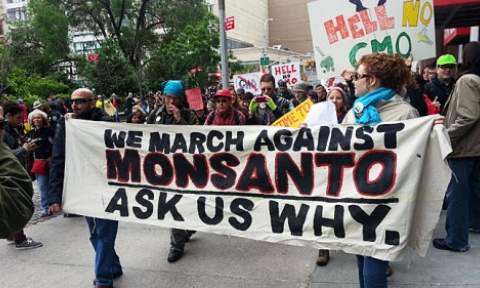
As Lily Tomlin has noted, "No matter how cynical you get, it's almost impossible to keep up."
For example, imagine if a prestigious group announced that this year's "World Environmental Prize" is being awarded to BP, for its unique contribution to the ecology of the Gulf of Mexico. No way, you say? Too absurd?
Yet, it has actually happened.
Rather than encouraging sustainable farming and self-sufficiency in impoverished communities as a way to alleviate poverty and malnutrition around the world, this year's World Food Prize has been "won" by a profiteering, biotech, seed-and-chemical monopolist that's the freakish opposite of sustainability.
Monsanto, which owns 90 percent of the world's genetically modified seeds, is globally infamous for bullying family farmers, bribing and corrupting governments, stiffing independent scientific inquiries into its hokum, running false ads and fraudulent PR campaigns, and going all out to keep consumers from knowing that the crops produced by its seeds contain alien, bioengineered DNA and have not been tested for long-term health and environmental problems.
Why would this avaricious outfit get any sort of award, much less one that can give it a false legitimacy as a corporate "savior" for the world's poor? Perhaps because Monsanto is a major funder of the World Food Prize. Indeed, the foundation that hands out the award is headquartered in downtown Des Moines in a historic building that recently got a spiffy remodeling, thanks to a $5 million donation from — you guessed it — Monsanto. The corporate honoree has also been a steady donor to the food prize foundation, giving some $400,000 to its promotion of industrial agribusiness in the last dozen years.
It was my privilege to go to Des Moines last week for Monsanto's World Food Prize extravaganza. Well, I didn't exactly get into the ceremony where the halo was being fitted on this predatory proliferator of proprietary GMO seeds. In fact, I wasn't even allowed to enter the Monsanto-financed edifice, wasn't invited to sip sauvignon blanc at the Rockefeller reception on the patio, and didn't get to mingle with the corporate, political, and foundation backscratchers at the official hullabaloo.
Rather, I was down the street at the graceful First United Methodist Church, where more than 500 of us scruffy "outsiders" gathered in protest of the Monsanto absurdity. There, real-life Iowa farmers spoke plainly about the myriad of abuses they have endured at the hands of the genetic manipulator.
One pointed out that if the corporation genuinely gave even one damn about hunger, it could've used its immense lobbying clout in Washington this year to stop Congress from stripping the entire food stamp program from the farm bill. Instead, Monsanto didn't lift a finger to help fend off hunger in our own country. It doesn't care at all about feeding the world, he said with disgust, it cares about profits, period.
Indeed, Monsanto is a pitch-perfect example of what Pope Francis was referring to in May, when he declared: "The worship of the golden calf of old has found a new and heartless image in the cult of money and the dictatorship of an economy which is faceless and lacking any truly humane goal." How ironic, then, that Monsanto bought this food prize for itself in order to masquerade as a world hunger fighter, hoping to persuade the Vatican to bless its demonic effort to force the world's poor farmers to buy and become dependent on its altered seed.
The World Food Prize Foundation has grandly dubbed its award "The Nobel Prize for Agriculture." But Monsanto has zero to do with agri-Culture. It is the agri-Business face of the cult of money that Francis warned about — and it has turned this award into the "Ignoble Prize."
Copyright Creators.com
No comments:
Post a Comment